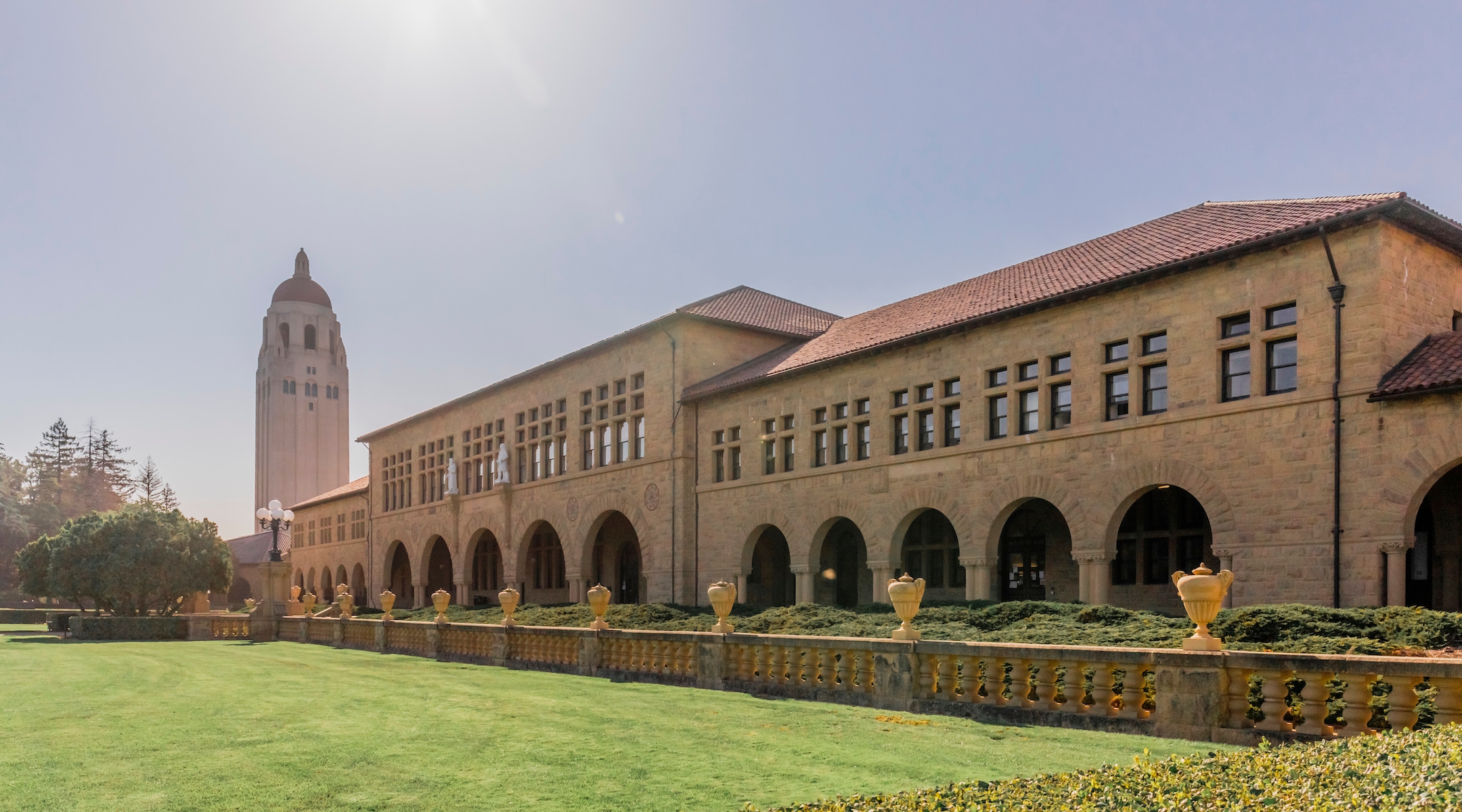At Stanford, a committee to address antisemitism is roiled by Jewish infighting
A Jewish studies professor with a history of fighting antisemitism at Stanford resigned after being accused of not being pro-Israel enough

Stanford students camp out in front of the university’s White Plaza to push the school to adopt more aggressive stances against Israel, Stanford, California, November 7, 2023. (Tayfun Cokun/Anadolu via Getty Images)
(JTA) – Ari Kelman spent the entire Hanukkah party looking over his shoulder.
A professor of Jewish studies at Stanford University, Kelman attended this year’s Stanford Hillel party traumatized by what he’d experienced the past few days on campus. People he didn’t know had declared themselves to be his enemy and had just successfully pushed him to resign from his role co-chairing the school’s committee to fight antisemitism — a committee he himself had lobbied the school’s president to form.
“I spent the night looking around the room, feeling suspicious of the people who are in the room — the people in the Jewish community of Stanford, that I am a member of, and have been a member of for more than a decade,” he recalled. “That was a bad feeling.”
That suspicion was born of attacks on Kelman from a range of voices to his right, including a Jerusalem Post columnist, anonymous students quoted in another publication and a group of alumni co-chaired by Kfir Gavrieli, a three-time Stanford alumnus and footwear CEO who advocated ousting Kelman from the committee’s leadership. Both Kelman and Gavrieli are Jewish, both care about Jewish life at Stanford and both say there’s an imperative need to fight antisemitism on campus amid the Israel-Hamas war.
But for Gavrieli and the sizable bloc of the Stanford Jewish community he says he speaks for, elements of Kelman’s past activism led him to believe that Kelman wouldn’t be an effective steward of the fight against antisemitism. At a moment when so many of the antisemitism allegations concerned debate over Israel, Gavrieli zoomed in on Kelman’s past links to non- or anti-Zionist groups. “There was a rich history of very concerning indicators,” he said he concluded.
The episode underscores how — even at a moment when polls show that the vast majority of American Jews are concerned about reports of rising antisemitism — differences in worldview and strategy have impeded efforts to combat it. Stanford is one of several elite schools that have aimed to address hostility toward Jewish students by forming an advisory committee on antisemitism. But now the committees themselves, and their members, have come under increasing scrutiny from activists who fear they will succumb to the same university culture that allowed antisemitism to fester on campuses in the first place.
“I was experiencing panic attacks trying to represent a community that did not want me to represent them,” Kelman told the Jewish Telegraphic Agency. “So I stepped down.” In a university release Friday announcing his departure from the committee, Kelman chalked it up to “pockets of Stanford’s Jewish community that strongly opposed my leadership on the committee.”
The committees have been formed after students, faculty, donors and other stakeholders of universities accused campus administrators of doing too little to safeguard their Jewish students in the face of antisemitism following Hamas’ Oct. 7 attack on Israel. Administrators hope such committees — generally made up of a mix of faculty, alumni and students — can help coordinate productive responses to the challenge of antisemitism on campus.
But committees at Stanford and other schools have since faced a challenging landscape. In mid-November, University of Pennsylvania President Liz Magill announced an antisemitism committee at her school “to better understand how antisemitism is experienced on campus.” Weeks later, she resigned after a congressional hearing where she and the presidents of Harvard University and the Massachusetts Institute of Technology declined to say that calls for the genocide of Jews constituted harassment.
Rabbi David Wolpe also stepped down from Harvard’s antisemitism committee after the hearing. Wolpe said the body was ill-equipped to address “the task of educating a generation, and also a vast unlearning.”
By contrast, Kelman believes he was forced out of a committee he himself had pushed for, and whose mission he believed in. After Oct. 7, Stanford was the site of several widely reported incidents of antisemitic behavior in conjunction with the war: A professor reportedly forced Jews and Israelis to stand in a corner of class; “Long Live the Intifada” was scrawled in sidewalk chalk near the site of a pro-Israel vigil; and students unfurled banners calling for Israel’s destruction. A campus sit-in that seeks to pressure the university to divest from Israel has continued for over a month. Its organizers recently met with the president and provost.
“After the 7th, you saw on our campus what you saw on lots of other campuses, which was people on the political left saying things, chanting things, tweeting things, supporting things that were calling for the destruction of the State of Israel, that were actively antisemitic, that were sort of violent, that were callous,” Kelman said. He specifically cited instances of students chanting “From the river to the sea,” a phrase associated with Palestinian liberation that many Jews have interpreted as a call for genocide.

A general view of the buildings of the main quadrangle and Hoover Tower on the campus of Stanford University, Oct. 2, 2021. (David Madison/Getty Images)
This wasn’t Kelman’s first rodeo with antisemitism at Stanford. In 2021, he’d led a task force investigating claims that the school discriminated against Jewish applicants in the 1950s, prompting the university to issue an apology. Afterward, Kelman joined the school’s newly formed Jewish Advisory Committee, whose mandate was, at first, broader than simply fighting antisemitism. One of its issues, he said, was “how do we get it so that Orthodox Jewish kids can get into their dorms on Shabbat without using electronic key cards?”
On Nov. 13, Stanford announced that its Jewish Advisory Committee would have a new subcommittee focused on ways “to combat antisemitism at Stanford, to enhance safety and support, and to build community.” It would include the Stanford Hillel director and a Jewish chaplain at Stanford, several current and emeritus professors — including Kelman — and Jewish undergraduate and graduate student representatives.
The committee — created alongside one for Muslim, Arab and Palestinian communities on campus — has already planned out around 30 listening sessions with Jewish and Israeli members of campus. There are currently no Israelis on the committee, though the school says it is working to recruit them.
Kelman soon faced backlash. An anonymous email, a version of which was forwarded to JTA, circulated among Stanford Jews detailing several issues with Kelman. Referencing the anti-Israel Boycott, Divestment and Sanctions movement and a leading anti-Zionist organization, the email declares that “Ari has a long history of alignment with BDS and Jewish Voice for Peace positions and activists.”
Soon prominent alums began attacking him in social media posts, and on Dec. 11, an article in Jewish Insider quoted anonymous student critics of his.

Kfir Gavrieli speaks at the press conference for a shipment of 3,000 L.A. produced face shields at LA County + USC Medical Center on April 14, 2020 in Los Angeles, California. (Presley Ann/Getty Images for Emergency Supply Donor Group)
Outside of the article, one of the most vocal critics was Gavrieli, the founder and CEO of the ballet footwear company Tieks. He earned a bachelor’s and two master’s degrees at Stanford and had been waging a parallel fight against antisemitism at the school in the wake of Oct. 7. Following the Hamas attack, he co-founded Stanford Against Hate, a group of Jewish and Israeli Stanford business school alums who circulated an open letter calling on the university to take concrete action against antisemitism.
The group also includes executives at LinkedIn and Google. Its letter makes eight demands of the university, including that it adopt a definition of antisemitism composed by the International Holocaust Remembrance Alliance that includes some criticism of Israel. The group also demanded that the campus ban rallies “that celebrate, glorify, or condone terrorist attacks or the destruction of Israel or that promote antisemitism.” And it called on the administration to meet with Jewish and Israeli students on a regular basis.
Kelman shares some of the group’s stated goals, but Gavrieli and others in his camp decided that a Kelman-led committee would exacerbate their concerns over antisemitism rather than alleviate them. In particular, Kelman opposes the IHRA antisemitism definition, which critics have accused of chilling pro-Palestinian campus activism.
In addition, Kelman co-authored a 2017 paper finding that Jewish college students at the time reported “low levels of antisemitism” and generally felt safe on their campuses. And he previously served as a faculty advisor for Open Hillel, a now-inactive organization that pushed Hillel International to relax its policies forbidding partnerships with groups that endorse boycotting Israel. In 2017, a member of the anti-Israel group Jewish Voice for Peace served as counsel for an amicus brief that Kelman signed onto.
On Dec. 11, Gavrieli linked to the Jewish Insider article in a tweet lambasting his alma mater — and Kelman.
“You’ve done even less than Harvard and Penn to protect Jewish students, and your Antisemitism Committee is chaired by Ari Kelman who’s aligned with JVP and antisemitic groups and is opposed to the IHRA definition of antisemitism,” Gavrieli posted on X, formerly Twitter, tagging Stanford’s account.
Gavrieli added, in all caps, “HE DOES NOT REPRESENT US.”
“We know that ideologically we’re not aligned with him,” Gavrieli told JTA. “I know people who we’re comfortable with, and I know who we’re not comfortable with.”
Kelman rejects the idea that he doesn’t take campus antisemitism seriously.
“It’s a total waste and a distraction,” he said. “I wrote papers in 2017 — like, really? You’re going to spend all week, you’re going to spend all this kind of energy doing that? How about actually saying, ‘Hey, there’s real problems. Let’s try to figure out ways to solve them,’” he said. “So stupid, right? Call me an antisemite, call me an anti-Zionist, call me a turncoat, it’s such a waste — so stupid. I feel like I’m 5 years old.”
He said he has never been affiliated with JVP, adding, “If I was, there’s nothing to be embarrassed about, but I’m not and haven’t been.”
The antisemitism committee members don’t appear to share Gavrieli’s discomfort. Rabbi Jessica Kirschner, the director of Stanford Hillel, called the concerns about Open Hillel a “red herring.”
“The heart of the matter is something else altogether,” Kirschner wrote in an email to JTA, without offering details. She added, “I think the work of the committee is incredibly important, and I am sorry that Ari stepped down.”
Gavrieli was one of a number of public critics to take aim at Kelman. The conservative Jerusalem Post writer Caroline Glick called Kelman “a self-hating Jew” and the online watchdog group StopAntisemitism posted, “Exactly WHY every University should adopt the IHRA working definition of antisemitism. When you can define what you’re fighting, people like Ari Kelman can’t sidestep or deny it’s actually happening.”
Kelman claims that no critic of his ever approached him directly about their concerns. But Gavrieli said there had indeed been attempts from his camp to talk to him — and added that the fact that Kelman was unaware of the level of animosity toward him was further evidence he should not be chairing the committee.
In the end, Gavrieli decided that nothing Kelman could say — not even his past work pushing Stanford to respond to antisemitism — could make up for his past stances on Israel.
Last week, Kelman told the committee he would be stepping down. Not even a direct appeal from the school’s interim president, Richard Saller, could convince him to stay. Saller said in a statement that Kelman had “the full confidence of the president, provost, and committee membership.”
Kelman will remain an advisor on the committee and told JTA he still corresponds regularly with its members.
“I want them to succeed,” he said. “I hope they don’t enter the headwinds that I did.”
As for Gavrieli, he commended Kelman for recognizing he could not do the job anymore but said his group still has concerns about other members who remain. (Multiple committee members told JTA its lineup has not yet been finalized.) He said that his group would continue to pressure the university to instead appoint members who more closely align with their views.
“The composition of the committee speaks volumes about the root of the problem here. And we can’t have people on them who share the ideologies that created the problem in the first place,” Gavrieli said. “I don’t want to suggest that these people share antisemitic ideologies. It’s that they share ideologies with an institution that allowed things to get this bad.”
This article originally appeared on JTA.org.















